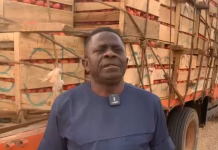The government has been urged to commit to establishing alternative livelihoods for individuals impacted by illegal mining, commonly referred to as galamsey.
A joint statement from the Research Staff Association (RSA) and the Research Scientists Association of the Council for Scientific and Industrial Research (CSIR) and the Ghana Atomic Energy Commission (GAEC) emphasizes that this initiative will help prevent residents in galamsey-affected areas from reverting to the practice.

Galamsey has garnered significant media attention recently due to its unregulated and destructive nature.
Organizations such as the Ghana Medical Association (GMA) and the Federation of Labour have expressed concerns about the health risks associated with galamsey and have called for a ban on all mining activities until a sustainable solution is implemented.
The researchers from CSIR and GAEC propose that alternative livelihood programs should be introduced in galamsey communities to strengthen the economic resilience of residents.
“The government must prioritize creating alternative livelihoods for those involved in illegal mining, especially youth and displaced farmers.
It is essential to expand job creation programs, vocational training, and access to financial services for small businesses in these affected areas.”
“Such livelihood programmes should be instituted in such a way that they offer similar or better economic value compared to the earnings from the galamsey operations.”
The researchers also urged the government to embark on a reclamation drive to restore all degraded lands and forest reserves across the country.
“We urge the government to initiate a comprehensive national programme for the reclamation of lands destroyed by galamsey.
This should include reforestation initiatives and the restoration of polluted water bodies, with priority given to communities most affected by the environmental damage.
“The government must collaborate with research institutions like GAEC and CSIR to employ innovative technologies in land reclamation and water purification.”
























































![[FREE FREE MONEY] Predict and Win a Guaranteed GH¢200 From Us EVERY WEEK](https://wordpress.ghanatalksradio.com/wp-content/uploads/2022/02/Predict-and-Win-Final-09-03-2021-218x150.jpg)
![[Predict & Win – 8th/Oct.] WIN A Guaranteed ¢200 From Us This Week](https://wordpress.ghanatalksradio.com/wp-content/uploads/2021/10/maxresdefault-16-218x150.jpg)
![[Predict & Win – 2nd] WIN A Guaranteed ¢200 From Us This Week](https://wordpress.ghanatalksradio.com/wp-content/uploads/2021/09/maxresdefault-50-218x150.jpg)
![[Predict & Win – 25th] WIN A Guaranteed ¢200 From Us This Week](https://wordpress.ghanatalksradio.com/wp-content/uploads/2021/09/maxresdefault-36-218x150.jpg)
![[Predict & Win – 18th] WIN A Guaranteed ¢200 From Us This Week](https://wordpress.ghanatalksradio.com/wp-content/uploads/2021/09/maxresdefault-23-218x150.jpg)








![[National cathedral] See full list of churches that have contributed since 2018](https://wordpress.ghanatalksradio.com/wp-content/uploads/2020/09/Ghana-National-Cathedral-GhanaTalksRadio-100x70.jpg)


